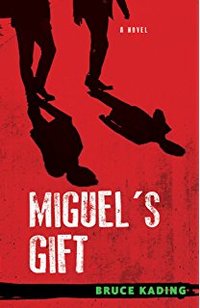
Published by Chicago Review Press on April 1, 2017
Nick Hayden is an immigration agent. He keeps himself busy arresting undocumented aliens in 1987 Chicago. His trainer, Charlie McCloud, has burned through his humanity from too many years on the job, but wants Hayden to view immigrants as people. Hayden struggles with that lesson for much of the novel.
Hayden joined the INS (as the agency was then known) to learn why an agent died on the job. To that end, he had to lie on his application. His job will be jeopardized if his secret becomes known, since the agent was Hayden’s father.
The Miguel who appears in the title is Miguel Chavez, a Mexican who crosses the border, travels to Chicago, buys a fake green card, gets a factory job, arranges for his wife and children to join him, and lives happily for two years before INS gets a tip from a disgruntled worker who is unhappy that Miguel got promoted ahead of him.
Hayden and his partner want Miguel to work with them to bust a Chicago supplier of counterfeit green cards. Being an informant is dangerous, and Hayden’s partner wants to follow the law enforcement tradition of making false promises of safety and future benefits to induce Miguel’s cooperation. Hayden sees Miguel as a decent person, not as a wetback, and struggles with putting Miguel’s life in danger. Not wanting to be deported and give up the life he has made for his family, Miguel agrees to take the risk.
I like the novel’s realistic depiction of inter-agency strife, particularly between the INS, which wants to deport undocumented aliens, and DEA, which wants to keep them in the country and use them as drug informants. I also appreciate the novel’s portrayal of government agents who view perjury and violating the Constitution as appropriate tools of law enforcement.
The recognition that law enforcement agents too often consider the law to apply to everyone but themselves leads to a nice discussion of the gladiator syndrome: law enforcement agents come to think of themselves as heroic figures who, feeling hamstrung by the requirement that they obey the law, decide to operate outside the law because they feel justified in their righteous crusade. After walling themselves off from social norms and developing a bunker mentality, gladiators become self-righteous assholes who can only find companionship in taverns with other gladiators.
At the same time, the novel offers a balanced view of INS agents, praising them for professionalism and efficiency while recognizing that some agents fail to meet that standard. Miguel’s Gift also offers a balanced view of immigration, making the point that politicians pander to the angry white men who condemn illegal immigrants while taking no action against the vast number of American employers that depend on illegal immigrants for cheap labor. Unless, of course, a politician needs INS to enforce laws against one business in order to help a competing business.
Ultimately, what happened to Hayden’s father, Hayden’s search for the truth, and Miguel’s career as an informant are all stories of politics within INS, the politics of bureaucracy. The bottom line is that politicians pretend to squawk about illegal immigration, but businesses need illegal immigrants to keep wages low, and politicians are in the pockets of business leaders. The novel illustrates how immigration enforcement hurts immigrants when the government tries to put on a show, while protecting businesses that create a demand for illegal workers from the risk that they get in trouble for hiring them. The novel is set 30 years in the past, but none of that has changed, other than an escalating level of angry rhetoric.
I give Bruce Kading credit for telling an entertaining if unchallenging story, but also for telling the truth about the politics of immigration policy. And I give him credit for illustrating the truth in a touching ending that good people are good people, even if they are branded as “illegals.” Miguel might be a bit too one dimensional, a bit too saintly, but it is nevertheless encouraging to see an undocumented immigrant portrayed in a positive light.
RECOMMENDED